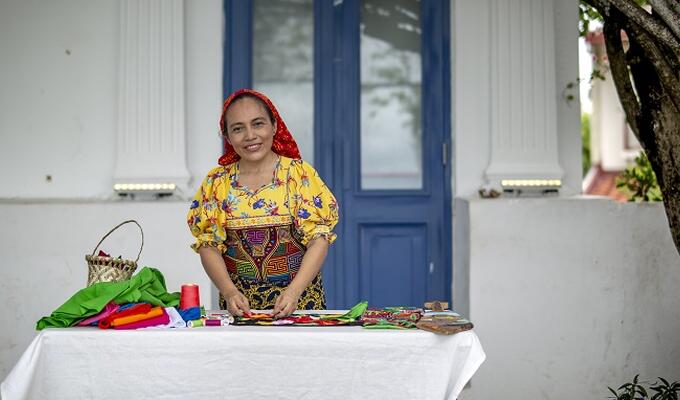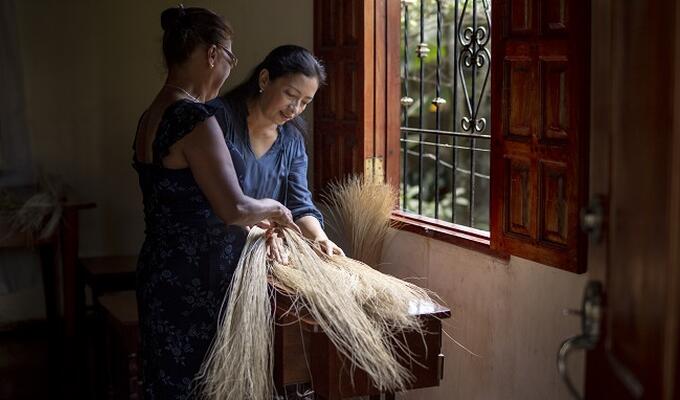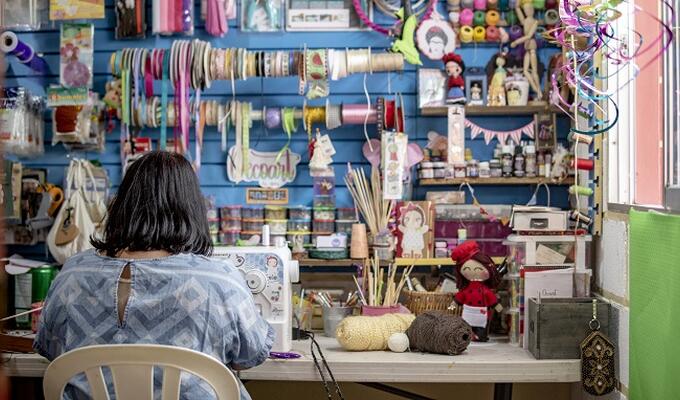



Boosting online sales for women-led handicrafts firms in Central America (en)
The challenge
Central America is renowned for its rich handicraft traditions, from unique textiles to distinctive jewellery. There are small businesses all over Costa Rica, El Salvador, Guatemala, Honduras, Nicaragua and Panama engaged in making and trading such goods.
Women often own these businesses and employ women workers, and their income is vital for their families and communities.
Meanwhile, market demand for handmade products is rising as consumers in markets such as Europe, Japan and the United States become more aware of the existence and value of owning things that are not mass-produced. People are prepared to pay more for handmade goods and cherish being able to purchase them directly from the people who make them.
The increasing ease and availability of e‑commerce has catalysed this increased demand of local handmade products for the gifts industry. It has opened international markets for micro, small and medium‑sized enterprises (MSMEs) in developing countries – including in Central America, where market studies conducted by the Secretaría de Integración Económica Centroamericana (SIECA) revealed that only 35% of the artisanal products reach international markets, mainly the United States.
The solution
ITC and SIECA joined up to develop the project ‘Linking Central American Women Business Enterprises with the Global Gifts and Home Decoration Market’, launched in late 2018.
E-commerce is particularly relevant for women entrepreneurs, who can operate from their homes and family businesses. ITC research into the Central American craft sector revealed that although 80% of the people working in this sector were women, they owned only 25% of businesses. By focusing on connecting women producers to online markets, the project seeks to provide economic opportunities for these women and ultimately address the gender imbalance.
In 2019, ITC trained coaches who work within local institutions to advise 200 women-led handicraft businesses to sell their products online.
The first e-commerce workshops took place in El Salvador and Panama for institutions from Costa Rica, El Salvador, Guatemala, Honduras, Nicaragua and Panama. The content focused on export business management, market research and e-commerce strategy to deepen the analysis of online market potential and the selection of key export products and markets.
The institutions included:
- Cámara de Industrias de Costa Rica (CICR)
- Organismo Promotor de Exportaciones e Inversiones de El Salvador (PROESA)
- Asociación de Exportadores de Guatemala (AGEXPORT)
- Cámara de Comercio e Industria de Tegucigalpa in Honduras, Asociación de Productores y Exportadores de Nicaragua (APEN)
- Dirección de Comercio Electrónico del Ministerio de Comercio e Industrias de Panamá
Throughout a week of learning, the local coaches had the opportunity to understand the importance of e-commerce, identify online channels and barriers to access them as well as the cost and revenue structure, and the pricing of products for the international markets, among other topics.
More regional workshops covered such topics as creating quality content for e-commerce, listing on international online marketplaces such as Etsy, eBay and Amazon Handmade, developing and optimizing e-commerce websites and managing online payments.
After each workshop, the coaches train the women-led businesses and advise them individually to support them in the export of their products through online platforms. The objective is to enable women-led handicraft businesses to develop a long-term strategy for selling their products in international markets through digital channels.
In addition to the workshops, ITC organises several e-labs to provide specific support to the most advanced companies. The e-labs combine testing, measuring and learning. By testing different online channels and digital marketing techniques, and measuring the performance, the more advanced companies can develop their e-commerce strategy and share lessons learned with beginners.
Initial e-lab results:
- 48 online orders from the US, Switzerland, Puerto Rico, UK, Italy, Austria, Russia and Guatemala in six months
- 15,403 visits of webshops, eBay and Etsy stores in six months
- 855 products listed on eBay, Etsy and websites in six months
- 3000 new Instagram followers in six months
Private sector partners such as eBay, Etsy, PayPal, Payoneer and DHL support the project with preferential rates as well as technical training or assistance.
Launched ahead of Christmas 2019, the eBay Central America Hub promoted a unique selection of jewellery, textiles, ceramics, leather and wood products – handmade by more than 45 Central American artisans and designers enrolled in the ITC / SIECA project. With the Central America Hub, eBay enables the women entrepreneurs to promote their products beyond domestic markets, potentially reaching millions of new customers around the world.
Some of the women-led businesses also opened stores on Etsy or developed their own webshop to promote their unique handmade pieces.
‘With targeted online campaigns and continuous tracking of the sales metrics, I will be able to successfully promote my brand abroad, especially in the United States,’ Soledad Borel of Soledad Art Jewellery, Costa Rica said. Thanks to training provided by ITC, eBay, PayPal, Payoneer and other partners, she is prepared to promote her brand abroad.
Online sellers such as Soledad Borel are becoming micro multinationals, which not only think across borders, but also have the tools to export and conduct business across borders.
The future
While activities in 2019 focused on identifying and selecting key export products and markets and opening and optimizing online sales channels, in 2020 the project will focus on using different digital marketing techniques to drive traffic to online stores and generate sales.



